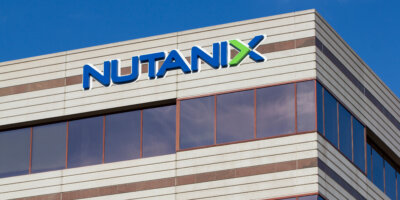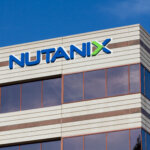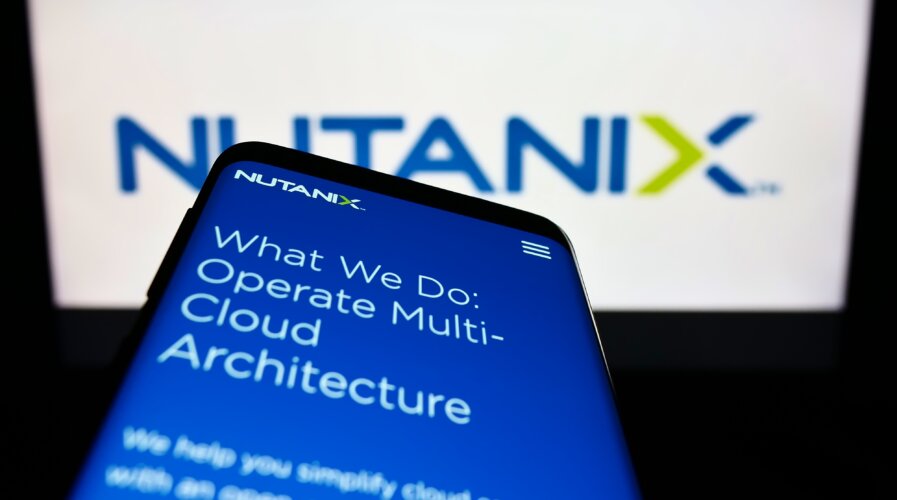
For Nutanix, investments in the hybrid multicloud and AI will be beneficial in 2024. (Image by Shutterstock).
Cloud and AI: 2024 could just be the best year for Nutanix
- 2024 could be a profitable year for Nutanix.
- The company could see increase in customers, especially those choosing to opt out from VMware.
- Nutanix believes it has the cloud and AI solutions to pick up VMware business from companies looking to use the hybrid multicloud.
As organizations look to build, deploy and manage more applications to meet their customer needs, the cloud and AI are becoming key enablers of success. In 2023, businesses have developed a huge appetite for generative AI, with some organizations seeing it as a core differentiator for their business processes.
According to a report by Gartner, worldwide IT spending is projected to reach US$5.1 trillion in 2024, an 8% increase from 2023. Specifically, the software and IT services segments will both see double-digit growth in 2024, largely driven by cloud spending. Investment in AI will also be a key focus for most companies in 2024.
For Nutanix, investments in the hybrid multicloud and AI will most likely be beneficial. Aaron White, VP and GM of sales at Nutanix APJ said that the big opportunity in AI right now was helping all enterprises take advantage of the huge opportunity it presents, not just the few organizations training huge models like ChatGPT.
“It’s all about apps and data. Including modern applications. The reality is that companies are running applications and data everywhere – most companies today are using multiple clouds, both public and private. They want this flexibility and choice since some applications and workloads are better suited for the private cloud, and some are better suited for public. Companies want one platform to run all their apps and data – across multiple clouds, public and private. We have the best solution,” claimed White.
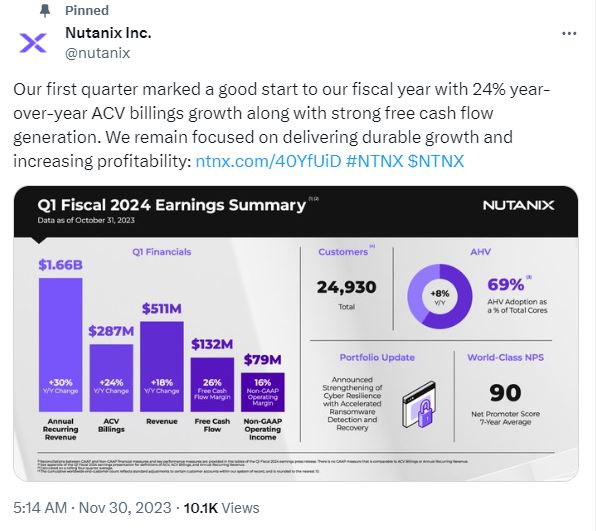
Nutanix’s growth is driven by its own strategic initiatives.
At the same time, White also believes that 2024 could be an interesting year for Nutanix. Given the recent acquisition of VMware by Broadcom, there have been reports of customers not being happy with their new options with VMware.
In a report by Forbes, it was predicted that the transition could affect VMware’s customer relationships, as customers may push back against the shift to subscriptions, which are generally perceived as more expensive than perpetual licenses. Also, while much of Nutanix’s growth was driven by its own strategic initiatives, CEO Rajiv Ramaswami acknowledged that the company did “close some additional deals” explicitly because of uncertainty about how the acquisition will unfold.
“VMware has historically been an innovative tech leader, but this acquisition will likely change the relationship that customers have with the company going forward. If you look at its history, Broadcom’s whole business model has been to maximize acquired assets in two to three years. We’re hearing concerns over these potential changes and we’re the best option for customers looking to reduce their dependence on VMware,” commented White.
Deluge of technologies: cloud and AI

Aaron White, VP and GM of sales, Nutanix APJ.
White added that the last 12 months had brought about an unprecedented surge of technology and innovation. The importance of the cloud and the growing preference for a hybrid infrastructure was reinforced as a business imperative.
“The digital-first world we live in today is enabled largely by the cloud. To deliver data and insights even faster, the edge has also emerged as a key differentiator for organizations. However, the hottest commodity was AI. Overnight, it dominated conversations. Most organizations hopped on the AI train, to different extents, with immediacy and a suitcase of uncertainty,” explained White.
However, White said that amid the deluge of new technologies emerging at breakneck speeds, and a sense of urgency to adopt these innovations, business decision-makers are starting to find themselves overwhelmed with new solutions. It increasingly feels like technology is happening to people, rather than for them.
“While AI will continue to dominate conversations, organizations need to take a quick step back and put in place a strong cloud strategy that will pave the way for their journey. It will be crucial to understand their technology stack, focus efforts on (re)building customer trust and cultivate the skills that will allow workers to keep up with the demands of an ever-evolving digital landscape,” added White.

The cloud and AI are becoming key business enablers. (Image generated by AI)
Hybrid multicloud will become the default choice for enterprises
As mentioned earlier, investments in cloud services across all sectors and regions will grow in 2024. Gartner predicts that, by 2025, 75% of enterprise data will be created and processed outside the traditional data center or cloud, up from a mere 10% in 2018.
Despite this surge, not every workload seamlessly aligns with the public cloud, and many enterprises grapple with legacy applications and data entrenched in on-premises or private cloud environments. Therefore, White believes that hybrid multicloud solutions that offer the best of both worlds will become the default choice for enterprises that want to balance performance, security, compliance, and cost. According to the Nutanix 2023 ECI report, 86% of IT decision-makers in APJ expect hybrid cloud to positively impact their businesses in 2024.
“On top of all this with the ever-expanding digital frontier, and as AI takes root in everyday operations, the inevitability of the hybrid multicloud as the default choice becomes a catalyst for transformative change. It not only addresses immediate challenges but positions organizations to thrive amid the uncertainties of tomorrow. The ongoing journey toward hybrid multicloud adoption represents a strategic paradigm shift—one where adaptability, resilience, and innovation collide to redefine the very fabric of modern enterprise IT,” mentioned White.

Hybrid multicloud solutions that offer the best of both worlds will become the default choice for enterprises. (Image generated by AI).
2024 will be about trust and skills
Given the surge in emerging technologies, cybercriminals are using them a lot more to wreak more havoc on organizations. Ransomware continues to be a major challenge for many countries and organizations, with Singapore reporting over 130 incidents last year, predominantly affecting small and midsize businesses in manufacturing and retail. These businesses, holding valuable information, are prime targets for cybercriminals seeking to extort and capitalize.
“Customer trust can be significantly impacted if their data is being compromised as part of the attack. The confidence of customers, partners, and investors is also diminished if user data is compromised. It will be crucial for organizations to build resilience against ransomware – detect and defend – within minutes,” said White.
So, as the technology sector continues to evolve and innovate, White believes trust will be a potent catalyst, allowing organizations to unlock the full potential of their teams to explore new ideas and take calculated risks. With technology providers continuing to invest in AI and ML solutions and services, it will be essential to embed security, privacy, and transparency into their systems as they are being built.
At the same time, the shortage of skilled professionals across the Asia Pacific capable of harnessing new and emerging technologies poses a significant hurdle. Previous reports estimate that the region will see the demand for skilled workers in cloud computing grow by more than threefold through 2025. Singapore for example, displays a strong demand for tech jobs, with 7 in 10 vacancies in information and communications in the country being new positions.
“With the speed of innovation, it might be difficult to predict what skills will be needed over the next few years. But one thing is certain: we’ll need to start building education into our workflows to upskill and reskill the current workforce to keep pace with evolving business requirements. Academic programs also need to evolve and ensure that students are being equipped with the right knowledge and skill sets for entering the workforce,” said White.
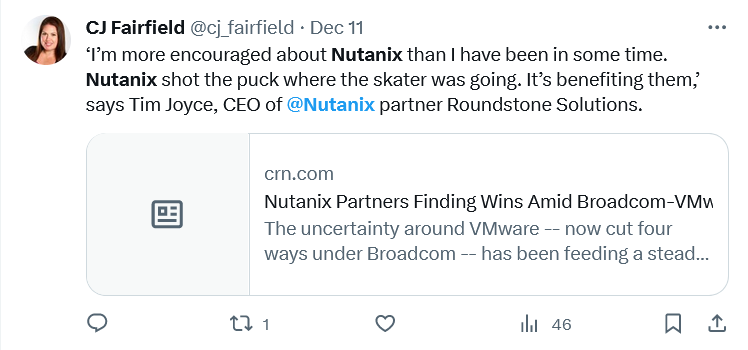
Nutanix moving in on disillusioned BMware customers.
While training should be a fundamental tool and requirement, White pointed out there is also a need for organizations to place more emphasis on skills, in addition to university degrees, to fully unlock the potential of its future technology workforce.
For example, in Singapore, more than 100 companies have pledged to hire tech workers using a skills-based approach, supported by a new handbook helping employers in recruiting skilled staff for tech roles. This initiative lets organizations use skills and talent sitting in plain sight and meet the increasing demand for tech professionals. AI and cloud tech is the development of the year, but without skilled people in tech roles, it’s just an expensive box.
“We are standing at the precipice of this transformative year – a journey toward resilience, innovation, and sustainability. As organizations take stock of the last 12 months and the tech odyssey that we’ve all been on, it is time now to take full advantage of the innovation. Having the right technology partner, skills, and talent, will be crucial as we take off to new technological heights,” White concluded.
READ MORE
- Safer Automation: How Sophic and Firmus Succeeded in Malaysia with MDEC’s Support
- Privilege granted, not gained: Intelligent authorization for enhanced infrastructure productivity
- Low-Code produces the Proof-of-Possibilities
- New Wearables Enable Staff to Work Faster and Safer
- Experts weigh in on Oracle’s departure from adland



